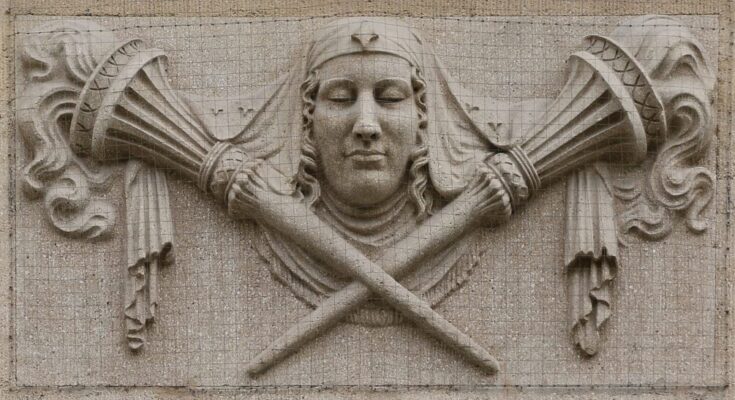
Hecate was a goddess for ancient Greek religion and mythology, and not a witch as some associate her with Halloween. She is most often shown holding a pair of torches, a key, or snakes, or accompanied by dogs, and in later periods depicted as three-formed or triple-bodied.
By Patrick Garner
Halloween can be spooky fun for modern Greeks, expats and tourists. Think of costumes, parties and trick-or-treating — but for sheer terror, the ancient Greeks had gods and goddesses so frightening that they were rarely named, lest the speaker draw attention to himself. It was much safer to call Hades, who was god of the Underworld, “the notorious one” or “he who receives many.”
Another dark divinity was Ares, the god of war. His battlefield shriek would freeze the blood of all who heard it.
There was also Hekate, a goddess who was not part of the Olympic pantheon of 12, but was so important that Demeter, the goddess of agriculture, called on her to save her daughter Persephone from the Underworld, and the ruler Hades permitted her to do so.
Ancient Greek Hekate inspires Wiccans
Because Halloween includes images of witches and Hekate is considered a goddess by Wiccans today, let’s delve deeper into her story. In ancient Greece, she operated in the shadows.
She slipped easily between the world of the living and dead. She knew no borders. In ancient Greece she could be found at a crossroads at night, torch in hand and hellhounds at her side, watching.
She befriended Hades as easily as she did the popular goddess of the hunt, Artemis. Hekate was not a child of Zeus, yet she was accepted by the Olympians as if she were. In fact, she was far older than any of them. None of that mattered because she never aged, and yet she represented all ages.
Hekate was known as a triple goddess. She personified maiden, mother and crone — or the female in youth, adulthood and old age. She was also the third goddess in the well-known Demeter-Persephone-Hekate trio. The back story on the three goes straight to the top of the Mt. Olympus pan‐ theon.
Zeus involved
Zeus had a role in most events in ancient Greece. He and Hades were brothers, but Zeus outranked him as king of the gods. When Hades took a fancy to Persephone, Zeus permitted him to abduct her into the Underworld to be his wife.
Persephone’s mother, Demeter, was frantic at her daughter’s sudden disappearance, and scoured the world for a year looking for her. Her despair caused crops to wither and fail, threatening famine to mankind and the end of sacrifices to the gods.
Finally Demeter turned to Hekate for help. Hekate was perfect for this task as she — unlike any of the other divinities — could so easily slip between worlds. She found Persephone in Hades’ realm.
The girl was returned to her mother outside the Greek town of Eleusis. Demeter was so relieved that she honored both Hekate and Persephone with an astounding gift to the town. The gift became known as the Eleusin‐ ian Mysteries. These mysteries promised initiates a better afterlife, and linked Demeter, Persephone and Hekate forever.
Was Hekate a witch in ancient Greece?
Hekate was not a witch and did not cast spells. Two thousand years ago in Greece, there were divinities, not witches.
The negative concept of witches was popularized by the Christian church. Today, those calling themselves Wiccan, that is, modern witches, reach back for inspiration to the Greek gods. What can be confusing is that in neopaganism, Hekate is sometimes assigned qualities never imagined by ancient Greeks.
Hekate had no need for what we call magic. She could as easily pull down the night as she could illuminate the dark crossroads she favored. Her torch could burn brighter than a full moon. Her eyes could see through the night and into men’s souls. With a mere glance from Hekate the hellhounds that surrounded her would instantly fall silent, and at a swipe of her hand the sky would darken and the stars disappear.
There is far more to tell. Here’s a twist that involves Artemis. Many of the ancient writers say that she and Hekate became close friends. Others say they were the same person.
What is remarkable is that Hekate was one of many last names for Artemis, as in, “Artemis Hekate.” If we follow this winding road, then Hekate was simply a darker aspect of Artemis.
Hekate represents crossroads and boundaries
In ancient Greece, statues of Hekate holding a torch were often placed at crossroads and boundaries. As triple goddess she was often shown in threes, each Hekate facing outward against a central column, seeing everywhere. These statues were called a hekataion. They saw all and guarded against evil.

When Hekate strode through the Underworld, her frequent companion was a large black dog known as She-dog. So fearsome were the two that, as they passed, even the shades of the dead stepped aside. Hounds were so closely tied to her that it was said that Hekate could even appear as a dog.
This turned out to work against the Spartans. They believed that the god Ares would give them an advantage on the battlefield if they offered him blood sacrifice. Unfortunately, they skipped the usual goats and sheep and turned to dogs. One must wonder what Hekate thought as hounds were offered to the heartless god of war. Perhaps she allowed the proud Spar‐ tans to eventually fall.
Hekate and Halloween aren’t usually linked. If one must, the banal takeaway is to bring a treat for the dogs as you scour the neighborhoods for candy!
Patrick Garner is the creator of the podcast Garner’s Greek Mythology, with listeners in over 180 countries. He is also the author of The Naxos Quartet, four novels about the startling appearance of Greek gods in the contemporary world. See www.patrickgarnerbooks.com



